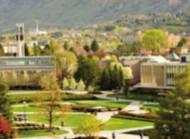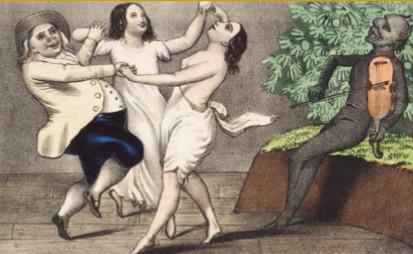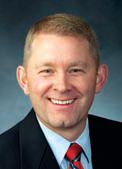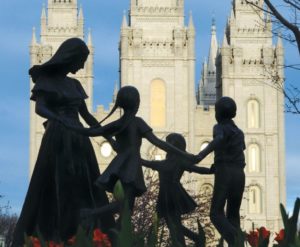I did not expect to spend years in theological conversation with Evangelicals. My autobiographical details, in fact, might have predicted something else entirely. Growing up in a densely Mormon Utah neighborhood, I viewed non-Mormons with suspicion. My parents were big-hearted Latter-day Saints who never taught anything but love, but somehow, I was wary of the Protestant church across the street from my boyhood home. As kids, we would gallop down its hallway on hot summer days, buy our cold 7-Up (we could scarcely believe they put a vending machine in a church), and sprint out as if the devil himself was on our heels. I was scared of the pastor and sensed that some chasm separated us from his congregants. These negative perceptions were reinforced during my years as an LDS missionary in Virginia and Maryland, where the “born agains”—we turned the phrase into a pejorative noun—unquestionably hated us most. At one point, I found myself staring down the barrel of a rifle wielded by a good Christian, we learned later, who apparently had little interest in Mormonism. (We didn’t stop to ask.) I left those two years sure that Evangelicals were the least Christian people on earth.
 My views started to change in graduate school. Training in American religious history provided new understandings of my church’s past and the ways it had been shaped by mistrust and violence on all sides. I also had to reckon with a memorable Evangelical cast of historical characters (John Calvin, Jonathan Edwards, Charles G. Finney, etc.) and their gifted Evangelical chroniclers (Mark Noll, George Marsden, Nathan Hatch, etc.). These academic experiences blunted much of my contempt, but it was a series of relational developments that drew me into sustained conversation with Evangelicals. Shortly after my appointment at Brigham Young University, a colleague invited me to meet with Evangelical students visiting campus. After spending an exhilarating few hours with them, it was clear to me that I’d happened onto an altogether different set of Evangelicals. Indeed, after accepting another invitation to meet with the LDS-Evangelical scholarly dialogue group in 2007, I was convinced that my youthful appraisals of Evangelicalism had been woefully one-sided. Having become acquainted with the history of American ecumenism, it also struck me that this dialogue was rather unique—even strange in many ways. Even so, I came to believe that it offered hope for a better kind of conversation between our two communities.
My views started to change in graduate school. Training in American religious history provided new understandings of my church’s past and the ways it had been shaped by mistrust and violence on all sides. I also had to reckon with a memorable Evangelical cast of historical characters (John Calvin, Jonathan Edwards, Charles G. Finney, etc.) and their gifted Evangelical chroniclers (Mark Noll, George Marsden, Nathan Hatch, etc.). These academic experiences blunted much of my contempt, but it was a series of relational developments that drew me into sustained conversation with Evangelicals. Shortly after my appointment at Brigham Young University, a colleague invited me to meet with Evangelical students visiting campus. After spending an exhilarating few hours with them, it was clear to me that I’d happened onto an altogether different set of Evangelicals. Indeed, after accepting another invitation to meet with the LDS-Evangelical scholarly dialogue group in 2007, I was convinced that my youthful appraisals of Evangelicalism had been woefully one-sided. Having become acquainted with the history of American ecumenism, it also struck me that this dialogue was rather unique—even strange in many ways. Even so, I came to believe that it offered hope for a better kind of conversation between our two communities.
Even as I strain against some of what I take to be its pitfalls, the dialogue has fed both mind and heart. I confess to somewhat selfish motives at first: I was sure I was watching something historically significant that would simultaneously bolster my pedagogy. (I teach courses on American religious history and hunger for insight into Evangelicalism.) This intellectual curiosity continues to fuel my involvement, frankly. And in the end, I hope to offer Evangelicals what I seek from them: I want to represent their faith in a way that does justice to its richness and complexity. I am by no means an apologist for Evangelicalism, but I would hope that Evangelicals could recognize themselves in my descriptions. I certainly would not want to misrepresent them in any way, and I credit the dialogue for providing me more nuanced understandings. I once joked with Richard Mouw that he’s “earned the right,” after countless hours with us, to comment on Mormonism. I hope I’ve done my part with Evangelicalism.
The dialogue has also provided countless opportunities to sharpen understanding of my own faith, historically and theologically. Comparative projects force these kinds of insights, I’ve learned. I wondered when joining the dialogue—and still do—how two communities without systematic theologies can even presume a theological dialogue, but it turns out that our conversations never fail to interest me. They help me see more clearly where we might intersect and where we can emphatically disagree. But for me, even the disagreements have been productive rather than destructive (as I often experienced them as an LDS missionary). By locating rigorous, academic conversations in relationships of trust that have been cultivated over time, we find ourselves able to articulate differences without recourse to derision, stereotyping, or dismissal. For instance, I am willing take Calvinism seriously—not something I was historically inclined to do—in part because of my admiration for the Calvinists I now count as friends!
I sensed early on that some dialogue members approached it as a kind of Mormon audition for “authentic Christian” status. Such a thing has never interested me. In fact, I spent my first year in the dialogue complaining that it seemed to implicitly interrogate Mormonism only. I felt, and still feel, that to do so would only inhibit real communication. I was touched when the Evangelical members not only heard my complaint about power dynamics, but also took pains to ensure that the conversations evolved to place the two traditions on more even footing. Even so, we struggle with fundamental questions. Why are we still talking? Where are our conversations going? Should they be going somewhere? While we sort through these and other questions, each side seems genuinely to appreciate knowing the other’s theology better. Similarly, both sides want warmer personal connections for our communities. Both sense that the past offers a host of examples of what not to do. At the same time, no one is interested in doctrinal compromise. No one seems even remotely interested in conversion to the other perspective. For now, most seem content in a rather rich middle ground—we’ve acclimated to conversations that avoid polemic dismissal on the one hand and relativizing soft-headedness on the other. Neither side can legitimately speak for its community in an official way—because the Mormon scholars have no general ecclesiastical authority and because the Evangelicals recognize none!—so we joke that nothing we say matters much anyway.
 Our conversations exist as academic exercises at the core, but we’ve found our religious lives intruding at almost every turn. The dialogue clearly intersects with my intellectual interests, but it has also provided some memorable moments for my LDS soul. I crave candor and openness, and this particular group not only tolerates my spirited accounts of Mormonism’s distinctive richness, it patiently tries to assimilate our Mormon variety or inconclusiveness on various theological points. Our LDS group represents a cross- section of Mormon intellectual life, after all, from “neo-orthodox” religion professors firmly committed to the Book of Mormon’s soteriology of Christ’s graceful justification to historians and philosophers who are equally at home with Joseph Smith’s more radical utterances relating to anthropomorphic gods and infinite humans. Especially given the “gotcha” style of “counter cult” approaches to Mormonism, I am profoundly grateful for Evangelical partners who are less interested in marking every Mormon slip-up or idiosyncrasy than they are in truly comprehending what makes a Latter-day Saint “tick” religiously. They compliment us by actually hearing us. LDS apostle Boyd K. Packer noted years ago that overtime, he’s cared less about being agreed with and more about being understood.1
Our conversations exist as academic exercises at the core, but we’ve found our religious lives intruding at almost every turn. The dialogue clearly intersects with my intellectual interests, but it has also provided some memorable moments for my LDS soul. I crave candor and openness, and this particular group not only tolerates my spirited accounts of Mormonism’s distinctive richness, it patiently tries to assimilate our Mormon variety or inconclusiveness on various theological points. Our LDS group represents a cross- section of Mormon intellectual life, after all, from “neo-orthodox” religion professors firmly committed to the Book of Mormon’s soteriology of Christ’s graceful justification to historians and philosophers who are equally at home with Joseph Smith’s more radical utterances relating to anthropomorphic gods and infinite humans. Especially given the “gotcha” style of “counter cult” approaches to Mormonism, I am profoundly grateful for Evangelical partners who are less interested in marking every Mormon slip-up or idiosyncrasy than they are in truly comprehending what makes a Latter-day Saint “tick” religiously. They compliment us by actually hearing us. LDS apostle Boyd K. Packer noted years ago that overtime, he’s cared less about being agreed with and more about being understood.1
For me, the dialogue has provided just that: understanding. And along the way we’ve forged rather tight bonds of love and trust around such a worthy goal. We’ve all found it much more difficult to dismiss or deride a theology when it is embodied. Perhaps some of our Evangelical counterparts are even less convinced we’re real Christians, but I doubt it. I am sure of this: I would be perfectly comfortable with Richard Mouw or Craig Blomberg or Dennis Ockholm answering questions about Mormonism in the press or in print. I would expect them to be clear about positions they disagree with—heaven knows they’ve been clear with us—but I know that my name or my faith is safe in their hands. The dialogue has been demanding and it has forced some tough questions, but for the most part I have been moved by the displays of generosity and humility on both sides.
Early on as a graduate student, I noticed that one could pay a heavy price for identifying as a person of faith. Not everyone reacted negatively, but my LDS faith cost me more than one friendship at my secular university. Probably partly as a result, I developed multiple modes of discourse: Mormon “talk” with my LDS ward members, academic talk with history colleagues, Mormon studies talk with LDS academics, and so on. The LDS-Evangelical dialogue has proven wonderfully destabilizing for that pattern of compartmentalization. In the dialogue, all the talk comes together in a rather raucous comingling of religious and academic discourse. It was jarring at first, but I’ve come to value it as a site of real personal synthesis, where my academic instincts and my religious sensibilities are both firing at full tilt. Perhaps both are always at work in me, but the juxtaposition is certainly more explicit in the dialogue. When in one instant I quote the Book of Mormon to underscore contemporary LDS Christo-centrism, my academic training then prompts a rehearsal of the nineteenth- century LDS sermonic tradition that checked and sometimes ignored those texts. And when I discourse on the robustness of Progressive-era Mormon theologizing, I’m in the next moment sharing how the New Testament has figured in my personal devotional life. The university that employs me is self-consciously dedicated to the life of the mind and spirit, and I’m struck by the ways the dialogue forces a kind of correlating education in me, one shaped “by study and also by faith,” as an early LDS revelation had it.2
If the early question animating the dialogue was “are Mormons Christian?”—and I think there is evidence that such was the case—I suspect the question now has become, “can Mormons and Evangelicals live up to their highest ideals, preserving their distinctive witnesses while comprehending the other more charitably?” From what I have seen, the answer is yes. No Evangelical in our group has backed away from his or her witness to the truth, as they understand it. But with that, each has offered friendship and understanding to us who have felt very much targeted in other contexts. For my part, I am not only even more deeply Mormon because of our conversations, I suspect I’m a better Mormon, too, in the sense that I can offer love and generosity, without reservation, to those I once deemed “enemy.” Surely, the God of reconciliation must approve.


